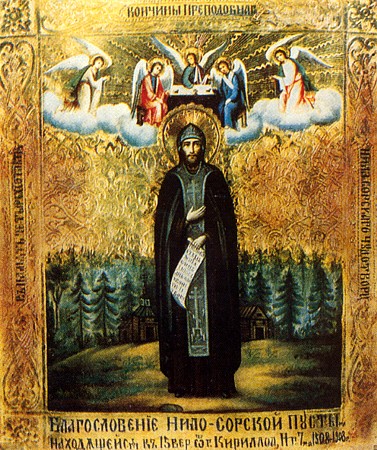Non-possessors on:
[Wikipedia]
[Google]
[Amazon]
 The non-possessors () belonged to a movement in the
The non-possessors () belonged to a movement in the
 The non-possessors () belonged to a movement in the
The non-possessors () belonged to a movement in the Russian Orthodox Church
The Russian Orthodox Church (ROC; ;), also officially known as the Moscow Patriarchate (), is an autocephaly, autocephalous Eastern Orthodox Church, Eastern Orthodox Christian church. It has 194 dioceses inside Russia. The Primate (bishop), p ...
in the early 16th century that opposed ecclesiastical land-ownership. It was led by Nilus of Sora
Nilus of Sora (also Nil Sorsky or Nil Sorski; ; secular name: Nikolai Maikov; ; – 7 May 1508) was a Russian Orthodox monk, spiritual writer, theologian, and the founder of the Sora Hermitage. He is best known as the founder of a tendency in t ...
(1433–1508) and later Maximus the Greek
Maximus the Greek, also known as Maximos the Greek or Maksim Grek (; ; ), was a Greek monk, publicist, writer, scholar, and translator active in Russia. He is also called Maximos the Hagiorite (), as well as Maximus the Philosopher.. His signat ...
() and others. They were opposed to the possessors (''styazhateli'') led by Joseph of Volokolamsk (1439/1440–1515), whose followers were known as the Josephites and believed that monastic possessions helped monks. The non-possessors were finally defeated at the Stoglav Synod in 1551. Both Nilus and Joseph were canonized.
The non-possessors are similar to other movements in Christianity, the Spiritual Franciscans
The ''Fraticelli'' ( Italian for “Little Brethren”) or Spiritual Franciscans opposed changes to the rule of Saint Francis of Assisi, especially with regard to poverty, and regarded the wealth of the Catholic Church as scandalous, with the ...
for example, in that they believed that ownership of land and the Church's possession of wealth in general had corrupted the church. The non-possessors also believed that the Church should not forcibly convert or persecute heretics or pagans, but should patiently work to convert them to the true faith.
History
Following the Sobor of 1503, the terms non-possessors (''nestyazhateli'') and possessors (''styazhateli'') came to be used. Joseph and his followers refused to accept the repentance of heretics following their apprehension, unlike the Transvolgan Elders, includingVassian Patrikeyev
Vassian Patrikeyev (; – between 1531 and 1545), also known as Vassian Kosoy (; real name Prince Vasily Ivanovich Patrikeyev), was a bishop of Rostov and confidant of Ivan III of Moscow. Vassian was an ecclesiastic and political figure and wr ...
. A dispute arose as Joseph of Volokolamsk (1439/1440–1515) stressed the importance of the monasteries receiving sufficient endowments to fulfil social responsibilities, while the other party led by Nilus of Sora
Nilus of Sora (also Nil Sorsky or Nil Sorski; ; secular name: Nikolai Maikov; ; – 7 May 1508) was a Russian Orthodox monk, spiritual writer, theologian, and the founder of the Sora Hermitage. He is best known as the founder of a tendency in t ...
(1433–1508) stressed the spiritual aspects of monasticism.
See also
*Heresy of the Judaizers
The Heresy of the Judaizers () was a religious movement that emerged in Novgorod and later Moscow in the second half of the 15th century which marked the beginning of a new era of schism in Russia. Initially popular among high-ranking statesmen an ...
*''Strigolniki
The ''strigolniki'' (; ) were followers of a Russian religious sect which appeared in the mid-14th century, known as ''strigolnichestvo'' (). They first appeared in Pskov before spreading to Novgorod and Tver. By the early 15th century, they had ...
''
References
{{Reflist Christian movements Russian Orthodox Church in Russia History of the Russian Orthodox Church Communalism